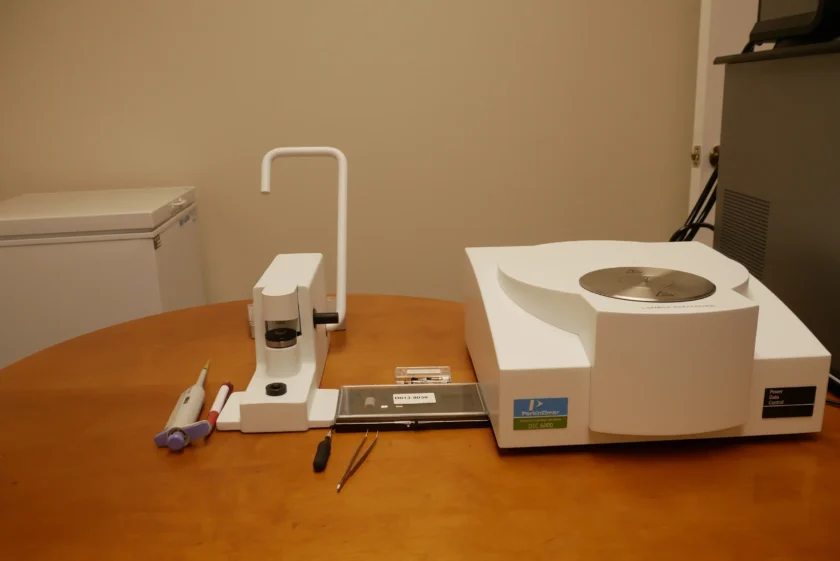Benchmark Lab's Reservoir Fluid Analysis: Advanced Analytical Solutions for Optimized Oilfield Performance
Reservoir Fluid analysis by Benchmark Lab Houston
Benchmark Lab proudly introduces its comprehensive suite of Reservoir Fluid Services, designed to address the multifaceted challenges of reservoir management and crude oil analysis. Our services are meticulously crafted to provide essential insights into reservoir fluids' composition, properties, and behaviors, facilitating enhanced recovery strategies and optimized production. From scale flow loops and chromatography to cutting-edge PVT analysis, our offerings cater to the entire lifecycle of oilfield development, ensuring that our clients stay ahead in the competitive energy sector.

Innovative Services Tailoring to Industry Needs:
• Scale Flow Loop:Our scale flow loop systems simulate oilfield water systems, enabling precise evaluation of scale deposition under dynamic flow conditions. This service is crucial for anticipating and mitigating scale-related issues, ensuring uninterrupted flow and extending the life of oilfield infrastructure.
• Chromatography for Crude Oil: We employ advanced chromatographic techniques to dissect the complex mixture of hydrocarbons in crude oil. This analysis is vital for understanding crude oil quality, refining processes, and the optimization of production strategies.
• Crude Oil Storage: Our secure and compliant storage solutions safeguard your crude oil reserves, maintaining their quality and readiness for processing or distribution.
• Oilfield Chemical Inhibitor Screening:We offer comprehensive screening services for oilfield chemicals, including corrosion, scale, and wax inhibitors, ensuring that the most effective chemicals are employed to protect your assets and enhance production efficiency.
• Emulsion Stability Test: Our emulsion stability testing assesses the stability of oil-water emulsions, critical for designing effective separation processes and enhancing oil recovery rates.
• Spectroscopic Analysis of Sample: Spectroscopy provides detailed insights into the molecular composition and structure of reservoir fluids, aiding in the characterization of crude oil and its constituents for better reservoir management.
• Crude Oil Properties: Understanding the fundamental properties of crude oil, including density, sulfur content, and API gravity, is essential for refining, marketing, and development strategies.
• Crude Oil Brine Separation Analysis: This service evaluates the efficiency of separation processes between crude oil and brine, optimizing production operations and reducing the risk of corrosion.
• Pour Point Test: The pour point test determines the lowest temperature at which crude oil remains fluid, crucial for pipeline transportation and storage strategies.
• Viscosity Test: Viscosity testing is key to understanding the flow characteristics of crude oil, informing transportation, storage, and processing decisions.
Coming Soon: Advanced PVT Analysis and Phase Behavior Modeling:
Benchmark Lab is excited to announce the upcoming expansion of our Reservoir Fluid Services with advanced Pressure Volume Temperature (PVT) analysis and phase behavior envelope modeling:• Condensate PVT Analysis:
• Black Oil PVT Analysis:
• Heavy Oil PVT Analysis:
• Phase Behavior Envelope Modeling:
These forthcoming services will offer unparalleled insights into the phase behavior of reservoir fluids under varying pressures and temperatures, enhancing reservoir modeling, field development planning, and recovery optimization.
Why Benchmark Lab for Reservoir Fluid Services?
Choosing Benchmark Lab means partnering with a leader in reservoir fluid analysis, distinguished by:• Comprehensive service offerings that cover the entire spectrum of reservoir fluid analysis.
• State-of-the-art laboratory facilities equipped with the latest analytical technologies.
• A team of experienced chemists and engineers dedicated to delivering accurate, actionable insights.
• Customized solutions tailored to meet the specific needs of each project.
Elevate Your Oilfield Operations with Benchmark Lab
Leverage Benchmark Lab's Reservoir Fluid Services to gain a competitive edge in reservoir management and crude oil production. Our advanced analytical capabilities, combined with our commitment to excellence, ensure that you have the insights needed to optimize production, maximize recovery, and sustain profitability.Contact Benchmark Lab today to discover how our Reservoir Fluid Services can transform your oilfield operations, preparing you for the challenges and opportunities of the dynamic energy sector.
Frequently Asked Questions
comprehensive suite of Reservoir Fluid Services tailored to address the challenges of reservoir management and crude oil analysis. Our advanced techniques, including scale flow loops, chromatography, and PVT analysis, provide essential insights into the composition, properties, and behaviors of reservoir fluids, facilitating optimized production and enhanced recovery strategies.
Our Scale Flow Loop systems are a cornerstone of our Reservoir Fluid Analysis services, simulating oilfield water systems to evaluate scale deposition under dynamic conditions. This analysis is crucial for anticipating and mitigating scale-related issues, ensuring uninterrupted flow, and extending the life of oilfield infrastructure, thus enhancing overall oil recovery rates.
Yes, through advanced chromatographic techniques, Benchmark Lab's Reservoir Fluid Analysis dissects the complex mixture of hydrocarbons in crude oil. This analysis is vital for understanding crude oil quality, refining processes, and optimizing production strategies, thereby improving the efficiency and outcome of crude oil processing.
Benchmark Lab is excited to announce the upcoming expansion of our Reservoir Fluid Services with advanced Pressure Volume Temperature (PVT) analysis and phase behavior envelope modeling. These services will offer unparalleled insights into the phase behavior of reservoir fluids under varying pressures and temperatures, enhancing reservoir modeling, field development planning, and recovery optimization.
Quick Contact
If you have any questions or need help, feel free to contact with our team.
Call Us Today:
Send Us Email:
©2024 , All Rights Reserved. Benchmark Lab


